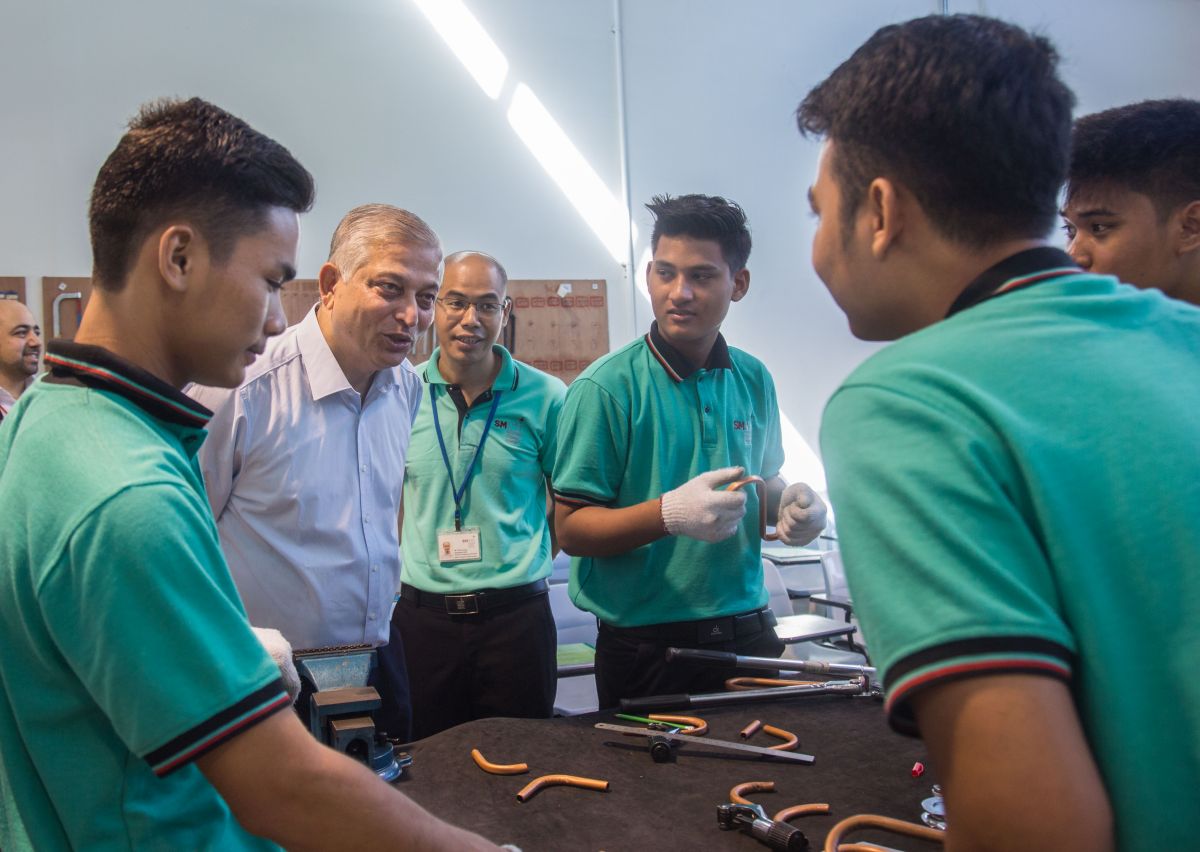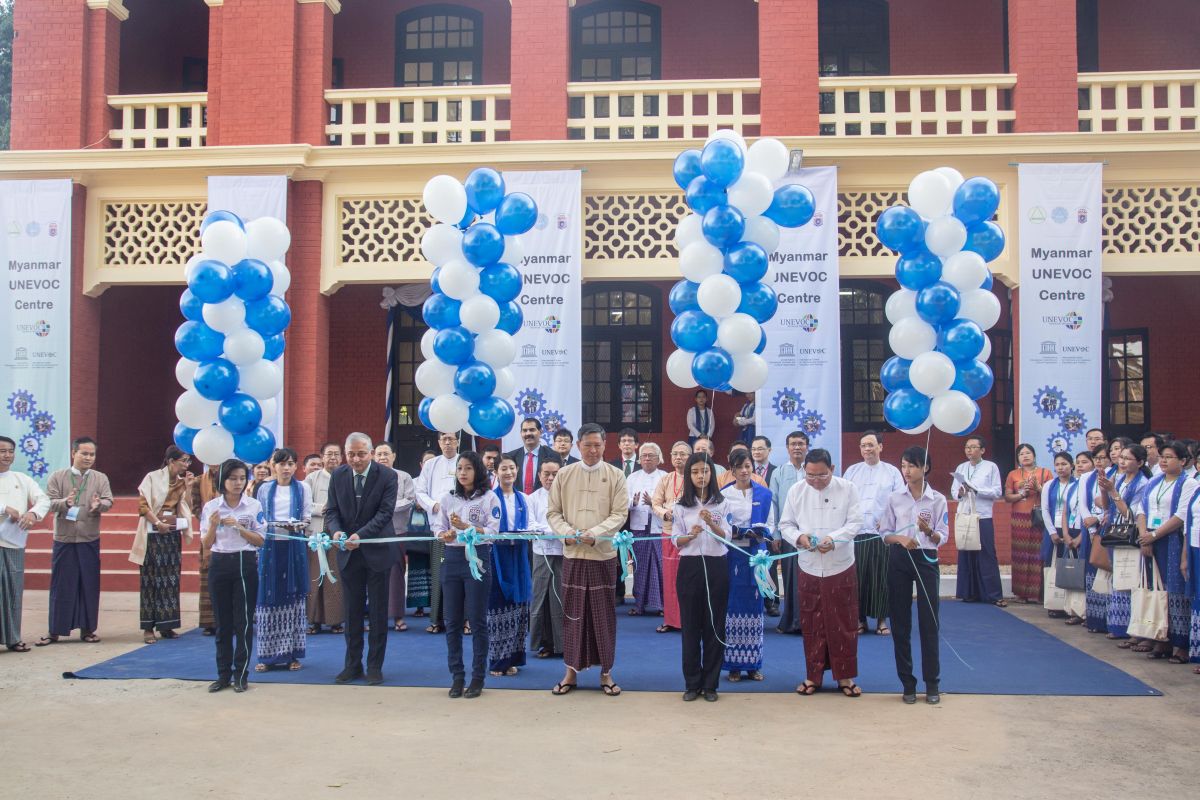
The UNESCO-UNEVOC International Centre: Who We Are | What We Do | Working With Us | Get in Touch
The UNEVOC Network: Learn About the Network | UNEVOC Network Directory
For Members: UNEVOC Centre Dashboard
Thematic Areas: Inclusion and Youth | Digital Transformation | Private Sector Engagement | SDGs and Greening TVET
Our Key Programmes & Projects: BILT: Bridging Innovation and Learning in TVET | Building TVET resilience | TVET Leadership Programme | WYSD: World Youth Skills Day
Past Activities: COVID-19 response | i-hubs project | TVET Global Forums | Virtual Conferences | YEM Knowledge Portal
Our Services & Resources: Publications | TVET Forum | TVET Country Profiles | TVETipedia Glossary | Innovative and Promising Practices | Toolkits for TVET Providers | Entrepreneurial Learning Guide
Events: Major TVET Events | UNEVOC Network News
December 3rd-4th, 2018
Yangon, Myanmar
UNESCO, together with the UNESCO-UNEVOC International Centre for Technical and Vocational Education and Training (TVET), the UNESCO Office in Myanmar![]() , and the GIZ
, and the GIZ![]() , is supporting the Ministry of Education (MOE) of Myanmar
, is supporting the Ministry of Education (MOE) of Myanmar![]() in its efforts to enhance quality provisions, the access of young people to TVET and the effective governance of TVET systems and institutions. The recently concluded two-day seminar and workshop in Yangon, Myanmar provided the opportunity to discuss the contextual realities that are challenging the shift towards pursuing excellence in TVET within Myanmar.
in its efforts to enhance quality provisions, the access of young people to TVET and the effective governance of TVET systems and institutions. The recently concluded two-day seminar and workshop in Yangon, Myanmar provided the opportunity to discuss the contextual realities that are challenging the shift towards pursuing excellence in TVET within Myanmar.

The Government of Myanmar developed its National Education Strategic Plan 2016-2021 (NESP)![]() underpinned by the targets of Sustainable Development Goal 4. The plan aims to offer high quality TVET that responds to labour market needs and is delivered through improved TVET governance. This is key to increasing employment, poverty reduction, and sustainable economic growth in Myanmar, given the fact that the unemployment rate in the country is relatively high for youth between the ages of 20 to 24. (Myanmar Ministry of Information)
underpinned by the targets of Sustainable Development Goal 4. The plan aims to offer high quality TVET that responds to labour market needs and is delivered through improved TVET governance. This is key to increasing employment, poverty reduction, and sustainable economic growth in Myanmar, given the fact that the unemployment rate in the country is relatively high for youth between the ages of 20 to 24. (Myanmar Ministry of Information)![]()
The TVET seminar, which was attended by experts from international and regional organizations as well as from 6 UNEVOC Centres in Cambodia, Sri Lanka, India, Singapore, China, and South Korea, coincided with the relaunching of the UNEVOC Centre and Knowledge Hub at the Ministry of Education (Department for Technical and Vocational Education and Training). The relaunch was officiated by his Excellency, Myo Thein Gyi, Union Minister, Myanmar Ministry of Education, and Mr. Shyamal Majumdar, Head of UNESCO-UNEVOC.

The seminar created a platform for discussing the opportunities and potential bottlenecks in the TVET sector in Myanmar that are hindering the successful implementation of the NESP and the abilities of the TVET system and institutions to respond to emerging demands. Guided by UNESCO and UNEVOC’s international experience in TVET development, as well as the rich experience and cooperation from selected UNEVOC Centres, the seminar facilitated knowledge sharing and increased synergy among members of the regional UNEVOC Network to enhance the development of TVET in Myanmar. UNEVOC Centres were encouraged to showcase their promising practices in enhancing quality in TVET at both the system and institutional levels.
Following the seminar, a UNEVOC Workshop on operationalization of the UNEVOC Centre was conducted with key ministry and institutional/school-level stakeholders to identify key institutional and professional capacity barriers. The role of the newly relaunched UNEVOC centre was discussed, including linking the principles of quality with day-to-day practices and its potential to serve as a keystone to facilitate the TVET institutional development process moving forward.